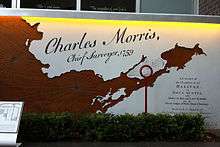Morris House (Halifax)

Morris House (also known as the Morris Office) is the oldest wooden residence in Halifax, Nova Scotia (circa 1764)[2] and the former office of Charles Morris (surveyor general). The house was originally located at 1273 Hollis Street, and since January 2013 has been located at 2500 Creighton Street. The Morris family used the house as their office for eighty years. There were four generations of the Morris family, a dynasty of Surveyor Generals of Nova Scotia, who used the building as their office. Due to the efforts of the Heritage Trust of Nova Scotia and others, the house has been salvaged from demolition in 2009. The original property was owned by Dennis Heffernan who sold it to Charles Morris Jr. in 1777, who likely had his father stay with him.
A Raman spectroscopic chemical analysis study at Saint Mary's University revealed that the interior paints and wallpaper contained 19th century inorganic pigments such as basic lead carbonate (white lead), lead carbonate, barium sulfate, calcium carbonate (chalk), and chromium(III) oxide (chrome green). The exterior was painted with a modern synthetic pigment, copper phthalocyanine (Phthalocyanine Blue BN). [3]
Local design firm Breakhouse partnered with eyecandy SIGNS INC. to design and build the monument sign that honours the life and home of Charles Morris. The sign is installed at the original location of the house. The house has been moved to Charles St in the North End of Halifax.
See also
- List of oldest buildings and structures in Halifax, Nova Scotia
- History of the Halifax Regional Municipality
- Great Pontack (Halifax)
References
Endnotes
- ↑ http://www.snaphalifax.com/index.php?option=com_sngevents&id%5B%5D=564314
- ↑ Robichaud, André, Jonathan Fowler and Colin P. Laroque. Dendroarchaeological Investigation of the Morris Building, Halifax, Nova Scotia. Mount Allison Dendrochronology Lab. MAD Lab Report 2011-05. Archival research indicates the Crown granted the land to John Baragon in 1750. Baragon subsequently sold the property in 1753 to Dennis Heffernan for £2 10s. It was not until 1764 that Heffernan registered a deed for the property. As stated by Jonathan Fowler "This may be interpreted as a sign that Heffernan was planning to construct a house on the lot, and wanted to ensure that the legal groundwork was in place." Dendrochronological research has provided "cutting" dates of the wood used in the construction of the house that range from 1741 to 1764, with the most reliable dates at 1758. The data thus indicates the latest date of construction for the Morris House at 1764 or a year or two later at most. Charles Morris' son Charles Morris (II) purchased the property from Heffernan in 1777 for £65.
- ↑ Harroun, S. G.; Bergman, J.; Jablonski, E.; Brosseau, C.L. Surface-enhanced Raman spectroscopy analysis of house paint and wallpaper samples from an 18th century historic property. Analyst, 2011, 136, 3453-3460. http://pubs.rsc.org/en/content/articlelanding/2011/an/c0an00832j#!divAbstract
Links
Coordinates: 44°39′20″N 63°35′26″W / 44.65561°N 63.59054°W